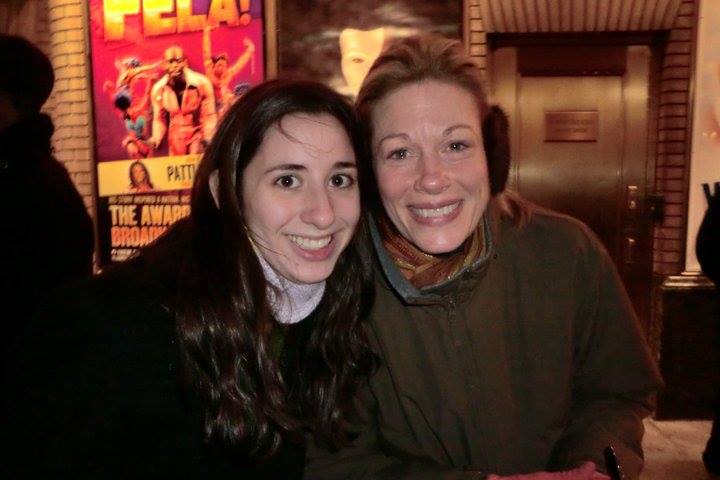Let me tell you a secret: Some miracles happen on a schedule.
When I see a live theater performance that grabs me — something that is, for my personal perspective, radiant and true and important — it is a radical bodily experience. I will return over and over again, aghast at the fact that on this stage, at this moment, this miracle repeats itself, eight times a week. And my favorite stage miracle of all is a show called “Next to Normal.”
“Next to Normal” isn’t a particularly spectacular musical. It has six cast members and a mostly static set. Even the lighting is stark: It was the first Broadway show to feature only fluorescent lights, so there’s no dimming. A light is on, or it’s off.
“Next to Normal” is a small story about one family. It won a Pulitzer Prize for Drama – an extraordinarily rare achievement for a musical – but it isn’t perfect. And still, it is the single piece of art with the greatest cumulative impact on my life. I discovered it as I was entering my sophomore year of college. It unlocked in me something I had been afraid to look at – the possibility of the terrifying depth of my mental illness. And it made me realize that even these worst-case scenarios, my greatest fears, are survivable.
I clung to that show like a life raft. I saw it six times before the academic year concluded. When I returned the next fall, the cast had turned over. I was excited to see how a new group of actors would tell me this story. Marin Mazzie – an actress of whom I had no prior knowledge – had taken on the starring role of Diana, opposite her real-life husband Jason Danieley as Diana’s husband Dan.
So, on an early September evening nine years ago, I entered the nightly ticket lottery and won a seat in the box. I spent the next two and a half hours leaning out of that box, physically drawn toward what was happening onstage. Even right now, so many years later, a different person leading a different life, I remember the smallest details of that performance. I remember Marin pressing her face into a baby blanket, an inconsequential prop in a box full of props, and inhaling deeply. I remember the quiet “oh!” of anguish she surprised out of me. I remember Marin cradling a music box in her hands. I remember weeping so hard at a show I was seeing for the seventh time.
I wrote in my journal that night, “It made me feel more than I initially wanted to, like any great art should.”
And I remember one more thing. I remember waiting at the stage door – something I did infrequently – specifically to talk to Marin. I wasn’t looking for an autograph or a picture (although I did request the picture above a few months later). I just wanted to thank her. Twenty years old, anxious and shy and full of more emotion than I could bear, I looked this stranger in the eyes and could think of nothing more to say than that “Thank you.” And she met my eyes and said, “Thank you,” and reader, I almost started crying again.
That was the entire interaction. I returned to “Next to Normal” another seven times before its closing, four months later, in January 2011.
On September 13, 2018, Marin Mazzie died of ovarian cancer at age 57.
I’m not going to claim that I have some special right to eulogize her. I only saw her perform one role, in one show. I didn’t know her personally. But that one performance was so important to me – is so important to me. And her kindness, and her brilliant sense of humor, and the ardor of her love were all evident in that performance. I want to honor that. Even if, once again, the only thing I can manage to say is “Thank you.”
Here is what I know about Marin Mazzie: She was outrageously funny, delightfully irreverent. A favorite moment of mine is when she told interviewer Susan Blackwell that her (Marin’s) vagina was “quivering” for the duration of the show when Barbra Streisand was in the audience. In a tribute video produced by Broadway.com, fellow actress Karen Ziemba said, “The thing about Marin is that even though … she had this patrician carriage to her, deep down, she was a real good-time broad.” Marin gave one of the saddest performances I’ve ever seen on a stage, and yet her wit shone through, the way stars are brighter in the blackest night sky.
Marin and her husband Jason were outrageously, absurdly, magnificently in love. During one performance, Jason did the entire first act of the show with Marin’s lipstick on his neck, and I can assure you it didn’t end up there as part of any onstage direction. (By the way, Jason himself is an outstanding talent with a voice and a stage presence that go on and on and on, spiraling into bottomless depths of emotion.) “So in love with you, my love, am I,” reads a small plaque on a seat at Lincoln Center Theater that Jason dedicated to Marin in March. (The line is a quote from “Kiss Me, Kate” – another one of Marin’s most lauded performances.) It is not my place to talk about this more, so I won’t, other than to say that their love has inspired and amazed me for nearly a decade now, and I know it existed long before that and will continue even longer still.
Marin was staggeringly talented. Her singing wasn’t just technically proficient; it was profoundly emotional. Her acting was invisible, in that certain way that onstage performance demands. She appeared as her character with apparent effortlessness. Had I not seen so many other women play Diana, I might have missed that every nuance of her performance was carefully considered. She precisely calculated the blend of acerbic wit, tender desire, and raw pain that she brought to the role. She made thoughtful, empathetic choices, and she saw them through to fruition.
And yet in her performance, she didn’t rely solely on skill. She also worked hard, in every performance, eight times a week. She hurled herself into her role as if she had no intention of returning. There’s a generosity in a performance like that. I watched her strive to bring me and the rest of her audiences some degree of catharsis, of closure. I watched over the course of four months as Diana’s story took deeper and deeper root in Marin’s consciousness. Her performances became even more emotional and raw, and her tears became more and more common. (Alice Ripley, the actress who preceded Marin, seemed to go through a similar experience over the course of her run in the show.) By refusing to put more emotional distance between herself and her character, she made a real, important sacrifice. How can I not be grateful?
It’s true: Some miracles — like theater performances and the beats of a human heart — happen on a schedule. But neither are eternal. They are with us only for a short while.

